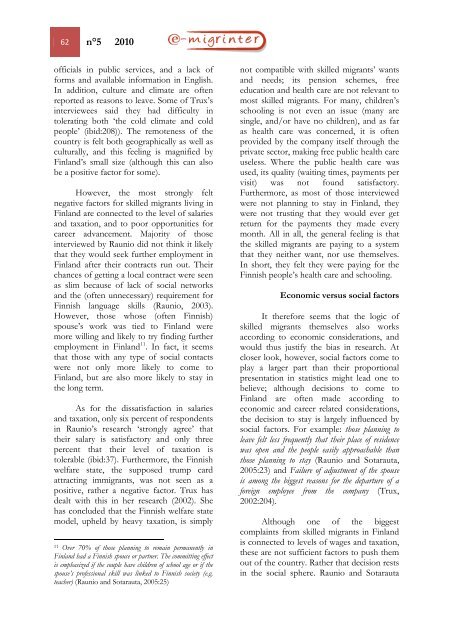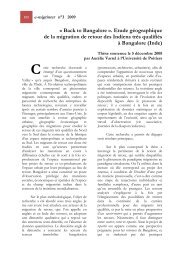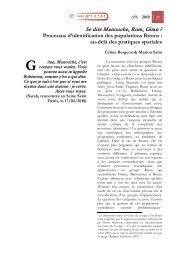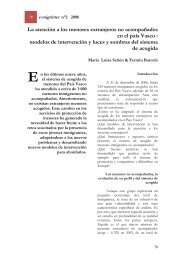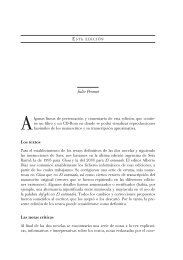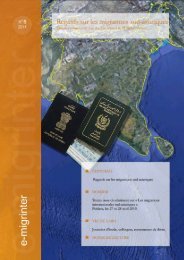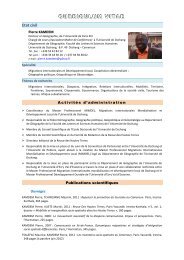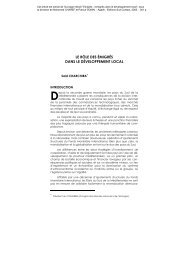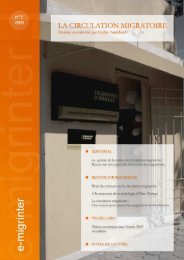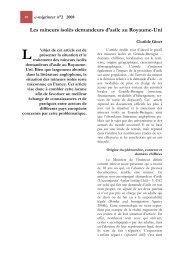e-migrinter 2010 numéro 05 - Maison des Sciences de l'Homme et ...
e-migrinter 2010 numéro 05 - Maison des Sciences de l'Homme et ...
e-migrinter 2010 numéro 05 - Maison des Sciences de l'Homme et ...
You also want an ePaper? Increase the reach of your titles
YUMPU automatically turns print PDFs into web optimized ePapers that Google loves.
62 n°5 <strong>2010</strong><br />
officials in public services, and a lack of<br />
forms and available information in English.<br />
In addition, culture and climate are often<br />
reported as reasons to leave. Some of Trux’s<br />
interviewees said they had difficulty in<br />
tolerating both ‘the cold climate and cold<br />
people’ (ibid:208)). The remoteness of the<br />
country is felt both geographically as well as<br />
culturally, and this feeling is magnified by<br />
Finland’s small size (although this can also<br />
be a positive factor for some).<br />
However, the most strongly felt<br />
negative factors for skilled migrants living in<br />
Finland are connected to the level of salaries<br />
and taxation, and to poor opportunities for<br />
career advancement. Majority of those<br />
interviewed by Raunio did not think it likely<br />
that they would seek further employment in<br />
Finland after their contracts run out. Their<br />
chances of g<strong>et</strong>ting a local contract were seen<br />
as slim because of lack of social n<strong>et</strong>works<br />
and the (often unnecessary) requirement for<br />
Finnish language skills (Raunio, 2003).<br />
However, those whose (often Finnish)<br />
spouse’s work was tied to Finland were<br />
more willing and likely to try finding further<br />
employment in Finland 11 . In fact, it seems<br />
that those with any type of social contacts<br />
were not only more likely to come to<br />
Finland, but are also more likely to stay in<br />
the long term.<br />
As for the dissatisfaction in salaries<br />
and taxation, only six percent of respon<strong>de</strong>nts<br />
in Raunio’s research ‘strongly agree’ that<br />
their salary is satisfactory and only three<br />
percent that their level of taxation is<br />
tolerable (ibid:37). Furthermore, the Finnish<br />
welfare state, the supposed trump card<br />
attracting immigrants, was not seen as a<br />
positive, rather a negative factor. Trux has<br />
<strong>de</strong>alt with this in her research (2002). She<br />
has conclu<strong>de</strong>d that the Finnish welfare state<br />
mo<strong>de</strong>l, upheld by heavy taxation, is simply<br />
11 Over 70% of those planning to remain permanently in<br />
Finland had a Finnish spouse or partner. The committing effect<br />
is emphasized if the couple have children of school age or if the<br />
spouse’s professional skill was linked to Finnish soci<strong>et</strong>y (e.g.<br />
teacher) (Raunio and Sotarauta, 20<strong>05</strong>:25)<br />
not compatible with skilled migrants’ wants<br />
and needs; its pension schemes, free<br />
education and health care are not relevant to<br />
most skilled migrants. For many, children’s<br />
schooling is not even an issue (many are<br />
single, and/or have no children), and as far<br />
as health care was concerned, it is often<br />
provi<strong>de</strong>d by the company itself through the<br />
private sector, making free public health care<br />
useless. Where the public health care was<br />
used, its quality (waiting times, payments per<br />
visit) was not found satisfactory.<br />
Furthermore, as most of those interviewed<br />
were not planning to stay in Finland, they<br />
were not trusting that they would ever g<strong>et</strong><br />
r<strong>et</strong>urn for the payments they ma<strong>de</strong> every<br />
month. All in all, the general feeling is that<br />
the skilled migrants are paying to a system<br />
that they neither want, nor use themselves.<br />
In short, they felt they were paying for the<br />
Finnish people’s health care and schooling.<br />
Economic versus social factors<br />
It therefore seems that the logic of<br />
skilled migrants themselves also works<br />
according to economic consi<strong>de</strong>rations, and<br />
would thus justify the bias in research. At<br />
closer look, however, social factors come to<br />
play a larger part than their proportional<br />
presentation in statistics might lead one to<br />
believe; although <strong>de</strong>cisions to come to<br />
Finland are often ma<strong>de</strong> according to<br />
economic and career related consi<strong>de</strong>rations,<br />
the <strong>de</strong>cision to stay is largely influenced by<br />
social factors. For example: those planning to<br />
leave felt less frequently that their place of resi<strong>de</strong>nce<br />
was open and the people easily approachable than<br />
those planning to stay (Raunio and Sotarauta,<br />
20<strong>05</strong>:23) and Failure of adjustment of the spouse<br />
is among the biggest reasons for the <strong>de</strong>parture of a<br />
foreign employee from the company (Trux,<br />
2002:204).<br />
Although one of the biggest<br />
complaints from skilled migrants in Finland<br />
is connected to levels of wages and taxation,<br />
these are not sufficient factors to push them<br />
out of the country. Rather that <strong>de</strong>cision rests<br />
in the social sphere. Raunio and Sotarauta


